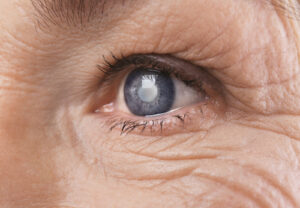Cataracts are a common eye condition that can cause a variety of visual symptoms, including blurry vision. They develop when the eye’s natural lens becomes cloudy or hardened.
Typically, cataracts develop gradually and don’t cause noticeable changes in your eyesight at first. But as time passes, you may feel like you’re looking through a foggy window.
Keep reading to learn more about cataracts, including whether or not they are age-related!
What is a Cataract?

Cataracts occur when proteins in your eye break down and clump together inside your lens. Over time, a cataract continues to grow, causing more visual symptoms.
Typically, your eye’s natural lens is clear. It has the very important job of focusing the light that enters your eye onto the retina, enabling you to see crisp, sharp images.
When the lens develops a cataract, it blocks light entering your eye and makes it gradually difficult to see clearly.
What Are the Signs of Cataracts?
Since cataracts tend to grow slowly, you might not notice any changes in your vision initially. But over time, you may experience the following symptoms:
- Blurred, cloudy, or foggy vision
- Poor night vision
- Halos and glare
- Sensitivity to light
- Colors appearing faded or dull
- Frequent prescription changes
- Double vision in one eye
- Need for brighter light for reading and other up-close activities
What Causes Cataracts?

Age is the most significant risk factor for cataracts. Experts believe that your body’s ability to fight the effects of oxidation on your lens decreases as you grow older.
In response to oxidative stress, the proteins in your eyes start to deteriorate, break down, and accumulate on your lens, contributing to cataract formation. Age-related cataracts may begin to develop at around age forty.
However, most people experience cataract symptoms by the time they reach sixty. Certain factors can cause you to develop cataracts earlier in life, such as:
Genetics
It is thought that genetics may play a role in the early development of cataracts. A family history of cataracts puts you at a higher risk of getting them earlier than usual.
Eye Trauma
An eye injury can lead to the clouding of your lens. This is called a traumatic cataract.
A traumatic cataract is usually due to a penetrating or blunt force injury to your eye, which damages the lens fibers. Some of the common causes of a traumatic cataract include:
- Head injury
- Chemical burns
- Infrared lights
- Electric shock
Traumatic cataracts develop soon after your eye injury or years later.

Diabetes
Uncontrolled blood sugar in patients with diabetes is linked to the early formation of cataracts. Having high blood sugar for long periods can damage the blood vessels in your eyes.
In turn, the damaged blood vessels can raise your chances of developing cataracts. Also, if you have high glucose levels over an extended period, enzymes in your eye lens may convert the glucose to sorbitol.
Sorbitol can make your lens swell, contributing to blurry vision.
Prolonged Use of Corticosteroids
Corticosteroids are medications used to reduce inflammation. However, long-term use of corticosteroids prescribed for blood disorders, severe allergies, and other health conditions can speed up the development of cataracts.
Lifestyle
Certain lifestyle choices can accelerate the formation of cataracts. They include:
- Smoking
- Excessive drinking
- Too much exposure to the sun’s UV rays
What Are the Treatment Options for Cataracts?
When cataracts are first developing, prescription glasses or contact lenses and stronger lighting can help you see clearly when you have cataracts. But eventually, your eye doctor will recommend surgery if poor vision from cataracts interferes with everyday activities like driving, reading, cooking, or watching TV.

Cataract surgery is the only way to get rid of cataracts for good and restore clear vision. During cataract surgery, your cataract surgeon will remove the cloudy lens and replace it with a new artificial lens called an intraocular lens (IOL).
The artificial lens implant is designed to remain permanently in your eye. There are different types of IOLs, including those that can provide clear vision at all distances.
Your ophthalmologist will discuss the various IOL options available before your procedure and help you choose one that meets your vision needs and lifestyle.
Can You Prevent Cataracts?
There’s no research that shows how to prevent cataracts. However, eye doctors suggest the following strategies to reduce your risk of developing cataracts early:
Quit Smoking
If you smoke, you can ask your doctor to help you stop.
Maintain Healthy Glucose Levels
For people with diabetes, it’s important to keep sugar levels in check to lower the risk of getting cataracts.
Wear Sunglasses
Wear high-quality sunglasses that block 99 percent to 100 percent of UVA and UVB rays. Also, invest in wide-brimmed hats to ensure your eyes are protected from all sides when you’re outdoors.
Eat Right
Add a variety of leafy greens and colorful fruits into your diet, including avocados, bell pepper, citrus fruits, broccoli, carrots, green peas, red grapes, kiwifruit, sweet potatoes, kale, and spinach. All these have essential nutrients and antioxidants that support your eye health.
Reduce Alcohol Intake
You don’t have to give up drinking altogether. Limiting your alcoholic beverages to one drink per day can decrease your risk of cataracts.
Avoid Corticosteroids
Although corticosteroids are very beneficial, care should be taken when using them. If you’re taking corticosteroids, discuss the potential risks with your healthcare provider.
Ask if there other treatment options instead or avoid using corticosteroids for prolonged periods.
Get Regular Eye Exams
Frequent eye examinations at Sierra Nevada Eye Center are essential in reducing the risk of cataract-related vision loss and maintaining your eye health. The experienced eye doctors at Sierra can detect a cataract early, closely monitor it, and recommend surgery before it significantly affects your vision.
Are you experiencing symptoms of cataracts? Schedule an appointment at Sierra Nevada Eye Center in Carson City, NV, today!


